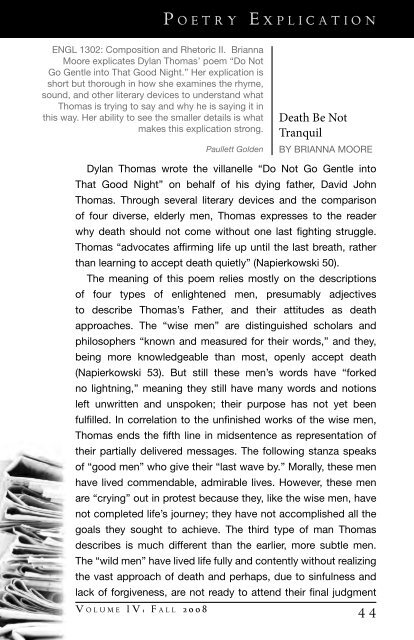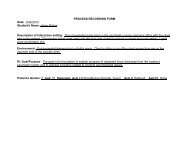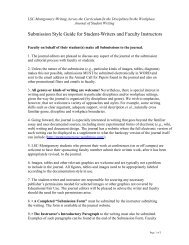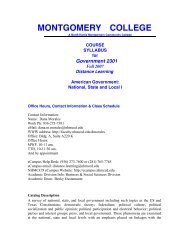2008 - Communication Across the Curriculum (CAC)
2008 - Communication Across the Curriculum (CAC)
2008 - Communication Across the Curriculum (CAC)
You also want an ePaper? Increase the reach of your titles
YUMPU automatically turns print PDFs into web optimized ePapers that Google loves.
P o e t r y E x p l i c a t i o n<br />
ENGL 1302: Composition and Rhetoric II. Brianna<br />
Moore explicates Dylan Thomas’ poem “Do Not<br />
Go Gentle into That Good Night.” Her explication is<br />
short but thorough in how she examines <strong>the</strong> rhyme,<br />
sound, and o<strong>the</strong>r literary devices to understand what<br />
Thomas is trying to say and why he is saying it in<br />
this way. Her ability to see <strong>the</strong> smaller details is what<br />
makes this explication strong.<br />
Paullett Golden<br />
Death Be Not<br />
Tranquil<br />
by Brianna Moore<br />
Dylan Thomas wrote <strong>the</strong> villanelle “Do Not Go Gentle into<br />
That Good Night” on behalf of his dying fa<strong>the</strong>r, David John<br />
Thomas. Through several literary devices and <strong>the</strong> comparison<br />
of four diverse, elderly men, Thomas expresses to <strong>the</strong> reader<br />
why death should not come without one last fighting struggle.<br />
Thomas “advocates affirming life up until <strong>the</strong> last breath, ra<strong>the</strong>r<br />
than learning to accept death quietly” (Napierkowski 50).<br />
The meaning of this poem relies mostly on <strong>the</strong> descriptions<br />
of four types of enlightened men, presumably adjectives<br />
to describe Thomas’s Fa<strong>the</strong>r, and <strong>the</strong>ir attitudes as death<br />
approaches. The “wise men” are distinguished scholars and<br />
philosophers “known and measured for <strong>the</strong>ir words,” and <strong>the</strong>y,<br />
being more knowledgeable than most, openly accept death<br />
(Napierkowski 53). But still <strong>the</strong>se men’s words have “forked<br />
no lightning,” meaning <strong>the</strong>y still have many words and notions<br />
left unwritten and unspoken; <strong>the</strong>ir purpose has not yet been<br />
fulfilled. In correlation to <strong>the</strong> unfinished works of <strong>the</strong> wise men,<br />
Thomas ends <strong>the</strong> fifth line in midsentence as representation of<br />
<strong>the</strong>ir partially delivered messages. The following stanza speaks<br />
of “good men” who give <strong>the</strong>ir “last wave by.” Morally, <strong>the</strong>se men<br />
have lived commendable, admirable lives. However, <strong>the</strong>se men<br />
are “crying” out in protest because <strong>the</strong>y, like <strong>the</strong> wise men, have<br />
not completed life’s journey; <strong>the</strong>y have not accomplished all <strong>the</strong><br />
goals <strong>the</strong>y sought to achieve. The third type of man Thomas<br />
describes is much different than <strong>the</strong> earlier, more subtle men.<br />
The “wild men” have lived life fully and contently without realizing<br />
<strong>the</strong> vast approach of death and perhaps, due to sinfulness and<br />
lack of forgiveness, are not ready to attend <strong>the</strong>ir final judgment<br />
V o l u m e I V : F a l l 2 0 0 8<br />
4 4






